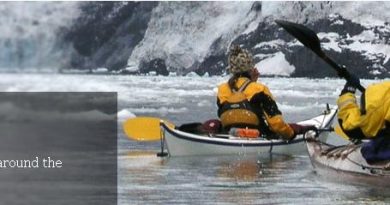Is Arctic policy in a funk?
The Aspen Institute recently launched a report on Arctic Climate Change. Among the usual suspects involved were Sheila Watt-Cloutier and Patricia Cochran, former Inuit Circumpolar Council presidents; Lloyd Axworthy, the former Liberal Foreign Affairs Minister who oversaw the establishment of the Arctic Council and initiated Canada’s Northern Dimension of Foreign Policy in 2000; and various other VIPs including Prince Albert of Monaco (!).
The report is well-intentioned and well written. But at the risk of sounding like a crank, it must be said that the most striking thing about the report is that it could have been written in 2007.
Its key finding is that Arctic governments should take immediate steps to develop a conservation and sustainable development plan for the Arctic marine environment – although the WWF put out its report on Arctic marine governance in 2008. It also seeks to 1) include indigenous peoples in Arctic governance (see Arctic Council, Establishment of, 1996); 2) promote cooperation in Arctic science (International Polar Year, 1882-83; 1957-58 and 2007-09?); 3) foster networks between government and civil society (this pretty much describes the public policy focus of the region since the 1990s); and 4) strengthen the Arctic Council (Norway tried to do so, unsuccessfully, during its chairmanship of the Arctic Council from 2006-09).
I agree with all of these recommendations. Who wouldn’t? The point to be made is that Arctic policy seems to be in a funk. Amid all of the change we keep hearing about in the Arctic, it seems regional governance is exactly where we left it.
Institutional change is hard, I know. And four years is not a long time in the grand scheme of international relations. But these questions have persisted for some time without much of a response, and no significant policy changes seem to be forthcoming at this week’s Arctic Council ministerial in Greenland. (US Secretary of State Hillary Clinton and Russian Foreign Minister Sergey Lavrov will be there; no word on who will represent Canada in the wake of former Foreign Minister Lawrence Cannon’s election defeat).
Although a new, legal instrument on Search and Rescue will be introduced, by all accounts it has marginal practical significance and does not impact existing national legislation. I am hopeful, but would be surprised, if outstanding issues such as implementing assessed financial contributions, establishing a permanent secretariat, or making a decision on the applications for observer status from China, South Korea, Japan and the EU will be resolved. And there hasn’t been a whisper about establishing some kind of regional seas agreement or formal marine conservation plan.
Reports and commissions like that of the Aspen Institute are not for naught. For one, the epistemological community in the Arctic is small and influential enough that a repetition of policy recommendations – the development of a common wisdom – often effects change. If all of the recommendations are sensible and desirable, then by all means let’s invoke commission after commission to push for them.
But I am also starting to wonder when it might be time to ask ourselves if there are other areas to focus our efforts. To accept the Arctic Council as it is and not as we wish it would be. And to accept that, for the time being, Arctic states are not interested in ambitious and meaningful multilateral initiatives. There are, after all, innumerable development issues in the North to contend with, and almost all of them need to be addressed at the local or national – not the circumpolar – level.
It will be interesting to see if low expectations are surpassed -or even met- at this week’s Ministerial.


